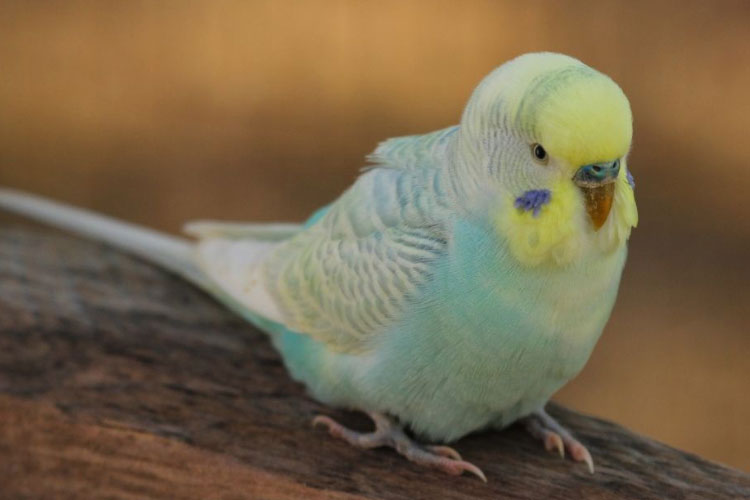When it comes to favorite fruits, Mango is on the top for many people. Again, sometimes bird owners want to share their sessional fruits with their pets and have this very common question, “can budgies eat mango?” Well, yes. You budgies can safely eat mangoes. It is rich in various vital nutrients, all of which can lead to better health for your pet birds. However, budgies love the flavor and taste of its juicy flesh. However, there are a few things you should consider, before adding it into their everyday diet plan.
In this blog, we will discuss how mango will benefit your pet and also talk about some limits you should follow while giving mangoes to them.
Can you feed mangoes to budgies?
Budgies have a craving for fresh fruits with a great flavor. The meal plan of your budgies should consist of approximately 10 % fresh and healthy fruits, and in this case, mango ranks top of the list of fruits recommended by nutritionists.
Mangos are full of nutrients that are great for your Budgie. Mangoes are healthy treats because they contain minimum saturated fat but instead full of nutrients.
The mango is one of the healthiest fruits that you can feed to your budgie to maintain a healthy diet due to the high levels of vitamins it contains.
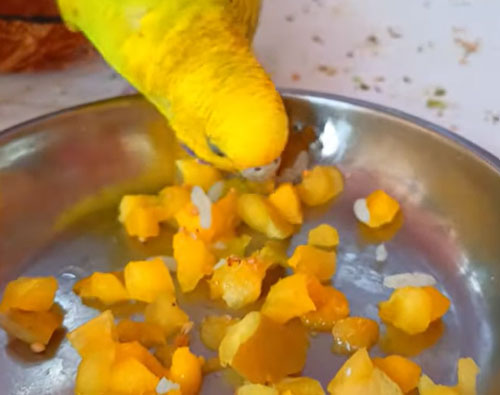
In addition, it offers some other potential health benefits. They are rich in various vitamins such as vitamins A, B6, C, E, K, and minerals such as iron, potassium, and even calcium.
Mango plays a vital role in boosting your pet’s immune system due to its high antioxidant level. Mangoes also contain a high quantity of fiber, which is beneficial for the digestion of your Budgie. This fiber helps feed your Budgie’s beneficial gut bacteria, which in turn helps avoid diarrhea as well as constipation.
Since mangoes have over 80 percent water, feeding mango to your Budgie can be an excellent way to ensure that it stays hydrated, particularly during the summertime of the year.
Because of the fruit’s natural sugar content, mango helps your pet to maintain the sugar content in their body. So, if your budgie is enjoying mangoes, you should add this tasty treat to its balanced diet.
Mango Nutritional Values
| Calories: | 99 |
| Protein: | 1.4 grams |
| Carbs: | 24.7 grams |
| Fat: | 0.6 grams |
| Dietary fiber: | 2.6 grams |
| Vitamin C: | 67% of the Reference Daily Intake (RDI) |
| Vitamin B6: | 11.6% of the RDI |
| Vitamin A: | 10% of the RDI |
| Vitamin E: | 9.7% of the RDI |
| Vitamin B5: | 6.5% of the RDI |
| Vitamin K: | 6% of the RDI |
| Niacin: | 7% of the RDI |
| Potassium: | 6% of the RDI |
| Magnesium: | 4% of the RDI |
Do Budgies Like mango?
Budgies love eating mangoes and also like the taste and color of mangoes. Most Budgies can’t stay away from the soft, flavorful, juicy fruits like mango. So, it is a healthy and sweet treat for them.
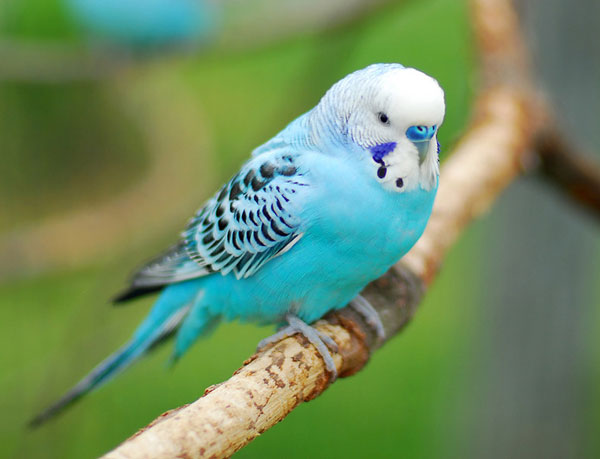
Health Benefits of Mango for Parakeets
Mangoes include a lot of essential nutrients, including vitamin A, vitamin C, potassium, antioxidants, and niacin, which are great for your budgie’s health.
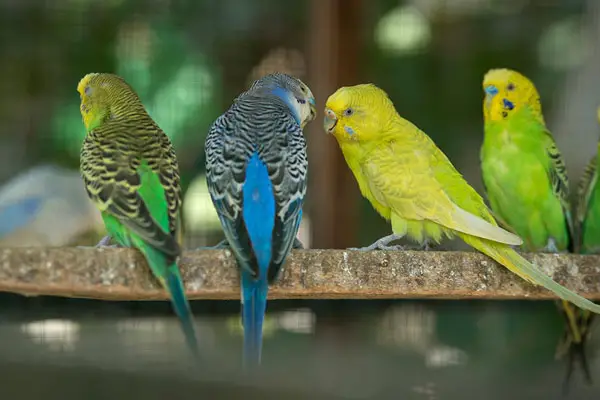
Vitamin A
Mangoes notably offer beta-carotene, which has significant positive effects on the health of your budgie since the body of your bird is constantly rebuilding epithelial cells as well as mucous membranes.
Vitamin C
Vitamin C is a vital nutrient for your budgies. Mango is quite high in vitamin C. One hundred grams of mango contains 36 grams of vitamin C. So it not only maintains your budgie’s immune system but also improves their cardiovascular health.
Potassium
Potassium is a key nutrient that promotes the growth and metabolism of your bird. The amount of potassium included in one cup of mango is relatively more than 250 mg.
Antioxidants
Mangoes include antioxidants like polyphenols, which are herbal plant compounds that help the body control the free radicals, hence reducing the risk of the body falling sick.
Niacin
Niacin is another essential component of mango. Niacin is in both raw and cooked mango. Niacin is a B vitamin that works in tandem with proteins to increase muscular strength. In addition to these benefits, niacin generally helps to limit fatigue in the joints and improves clean arteries.
How many mangoes should budgies eat?
Mangoes are high in sugar, which can cause diabetes as well as other health issues in pets. Therefore, you should control the food portions. It is recommended to give your budgie mango that is roughly the size of 1/2 grapes.
Your bird shouldn’t eat mango on a daily diet; instead, leave it as an evening treat and give it occasionally per week. We suggest you give your budgies mango nearly twice a week.
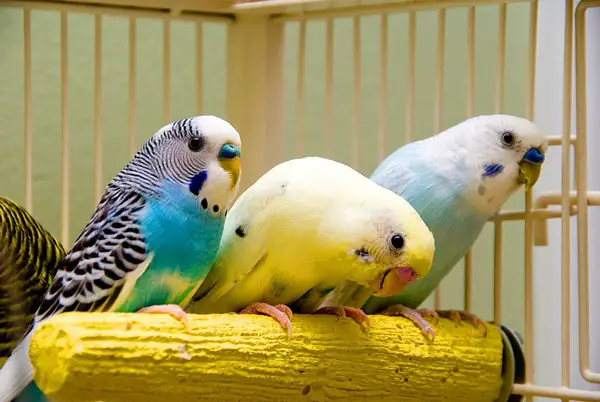
To prevent any illness to your budgies, stop giving them too many mangoes and limit their mango consumption to one or two times per week.
If they consume an excessive amount of mangoes for a long period, budgies may face the risk of type 2 diabetes. You have to consider feeding it no more than two mango slices at a time.
How do you prepare mango for budgies?
Follow the details of how you have to feed mango to your budgies:
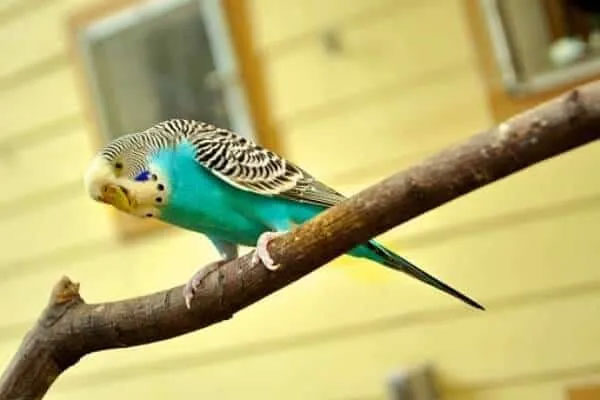
- The pre-process of mango for your budgie is pretty simple and quick. At first, you need to remove the mango skin and slice it in half to pull out the mango pit.
- You can sometimes give your budgie mango skin as it also contains some essential vitamins.
- The pit in the mango is not dangerous; however, as they’re so large, it is recommended to remove them before giving the mangoes to your budgie so that your pet can enjoy the fruit fully.
- To feed your budgie, simply slice up the mango pulp into smaller pieces.
- Additionally, as fruit seeds are harmful to your pet, you have to remove the mango seed before serving.
- While your budgies are eating the mango, they may spend too much time around in it. To avoid bacterial growth, replace the mango’s remnants from the birdcage immediately after eating it.
Can you feed mango to baby budgies? If so, how?
Mangoes are perfectly safe for baby budgies to eat. But, consider removing the pits as well as seeds of mangoes before giving them to them.
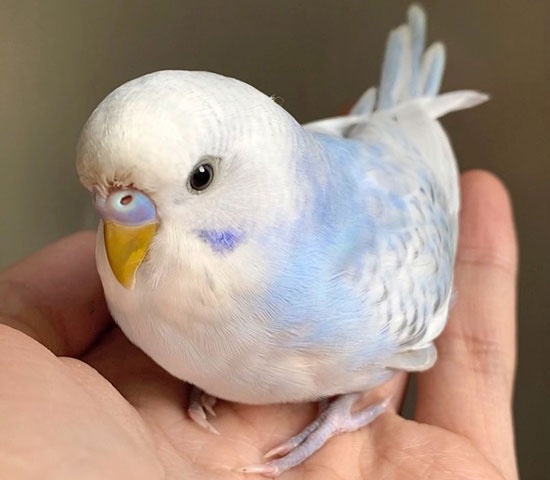
After removing the mango skin and seeds, make small mango slices so that this won’t disturb the digestive system of the baby budgies. Don’t add mango to their daily diet but rather start feeding them with a very small amount first as an occasional treat.
FAQ
Mango, whether raw, cooked, or frozen, is a suitable diet for budgies. But, once you cook or freeze the mango, it loses a large percentage of its minerals as well as the luscious, sweet taste; as a result, it may not be healthy and fresh mango-like before. Even though mango can be served after cooking or freezing, the freshest mango has the best flavor and is the healthiest option.
Yes, Budgies can safely eat mango leaves and stems, which are also a wholesome source of food for them. A lot of birds like to eat such plant elements.
Conclusion
Among the variety of fruits, mango is undoubtedly one of the healthiest fruits for your budgie, if you maintain the portion sizes avoid giving your budgie excessive sugar. So, treat your pet with this fresh & juicy mango in a mannered way.
Do you know if your budgies can eat biscuits or blackberries? Read our articles about it to learn more.
